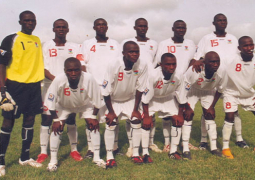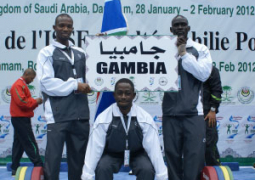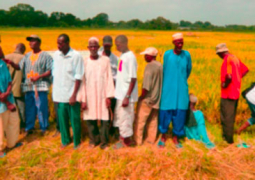The Governor of the Central Bank of The Gambia, Bamba Saho, has revealed that the outlook for the Gambian economy for the remainder of 2010, remains positive, reflecting increased global activity, expansion in agriculture production and moderate growth in residential construction.
He stated that though inflation has begun to pick up slightly, it is expected to remain low in single digits.
The risks to the outlook mainly relates to the strength of the global recovery, increase in volatility in the international commodities market, particularly oil prices and uncertainty in financial markets, he added.
Governor Saho was speaking last Friday at the meeting of the Monetary Policy Committee of the Central Bank of The Gambia.
He noted that taking the above-mentioned factors into consideration, including the risk to the outlook, the MPC has decided to maintain the re-discount rate at 14.0%.
According to Mr. Saho, the Gambian economy is projected to expand by 5.0% in 2010, lower than the revised estimate of 5.6% in 2009.
"Agricultural valued-added is estimated at 4.4%, industry 5.1% and services 4.9%," he said.
Governor Saho stated that since the last MPC meeting, global output has expanded faster than anticipated, with growth in many emerging economies accompanied by moderate recovery in most advanced economies. The global recovery, he added, is driven mainly by rising manufacturing activity, and the restoration of consumer confidence.
"World output, which contracted by 0.6% in 2009, is projected to expand by 4.2% in 2010 and 2011, respectively. However, the strength of the global recovery is impaired by fiscal fragilities, massive government debt and increasing commodity prices," he said.
"From end-December 2009 to end May 2010, the Dalasi depreciated by 2.21% against the US dollar partly reflecting developments in the international foreign exchange markets, where the US dollar was the comeback currency; appreciating against the major currencies.
"On the other hand, the Dalasi remain resilient against Euro, Pound Sterling and CFA over the past five months. From end December 2009 to end-May 2010, the Dalasi appreciated against the Euro by 2.03% and Pound Sterling by 1.3%," Saho noted.
He stated that monetary supply accelerated to 21.7% in the 12 months to end May 2010, as compared to 19.4% a year earlier, adding that of the components of money, narrow money rose by 16.1% and quasi-money by a stronger 27.5%.
He revealed that reserve money grew by 15.7%, compared to 8.7% in the preceding year, and that preliminary estimates of government fiscal operations indicate that total revenue and grants amounted to D1.3 billion (23.0% of GDP) in the first three months of 2010 relative to 1.2 billion (24.0% of GDP) a year ago.
Governor Saho also revealed that net credit to government and claims on public entities rose by 24.6% and 12.1%, respectively, while lending to the private sector increased by 16.7%.
Commenting on the banking industry, Governor Saho stated that the banking industry continues to show increasing signs of resilience with growth in assets, capital and reserves, and that total industry assets increased to D15.5 billion at end March 2010 from D14.6 billion in December 2009.
Non-performing loans as a ratio of gross loans, he said, deteriorated from 12.0% in December 2009 to 16.9% in March 2010. This was as a result of the Central Bank's inclusion of restructured loans in non-performing, he stated.
He also added that food consumer price inflation declined to 5.3% in April 2010 from 7.8% in April 2009. Food inflation was 8.3% and 7.8% at end-March and end-April 2009 before declining to 6.7% and 2.7% in the second and third quarters of 2009.
"While consumer food inflation was below 3.0% in the fourth quarter of 2009, it surged to 5.0% at end-March 2010 before settling at 5.3% at end-April 2010," Mr. Saho stated.





